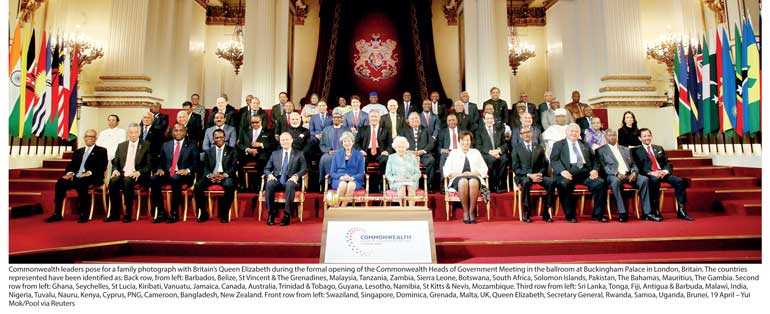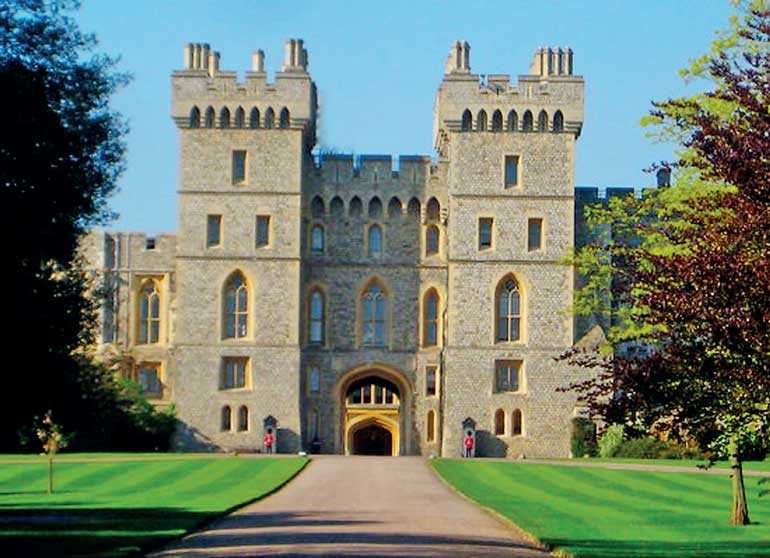Monday Feb 23, 2026
Monday Feb 23, 2026
Friday, 20 April 2018 00:00 - - {{hitsCtrl.values.hits}}


The leaders of the Commonwealth’s 53 member countries who gathered in the UK for the first time in over 20 years for their biennial summit yesterday will attend the Leaders’ Retreat hosted at Windsor Castle today.
The official opening of CHOGM and the meeting that took place at Buckingham Palace and the State dinner hosted by the Queen also marked Queen Elizabeth II’s extraordinary tenure as Head of the Commonwealth and the UK succeeding Malta as ‘Chair-In-Office’ of the Commonwealth until 2020.
Following the opening ceremony, the Queen and Charles hosted the traditional lunchtime reception for new Heads of Government in the palace’s 1844 Room.
The Queen’s Dinner in the evening at the palace, hosted by the monarch, was joined by the royal family.
The royals were also very involved throughout the week, reflecting their areas of interest. Prince Harry was at the Youth Cabinet Roundtable and opening session of the Commonwealth Youth Forum at the QEII Conference Centre in London and a Youth Forum reception. Prince William was at the ‘Welcome to the UK’ reception at the QEII Conference Centre, and also a joint session of the Commonwealth Business and Youth Forums.
Charles gave the keynote address at the ‘Malaria No More’ summit and the Duchess of Cornwall was at the closing session of the Women’s Forum.
The State Leaders’ Retreat at Windsor Castle today is a day in which leaders engage in frank dialogue and set the course for future Commonwealth cooperation.
Among the issues discussed yesterday that would be up for review today are trade and prosperity (in a post-Brexit world); human rights, democracy, and good governance; small states, resilience and climate change; security, terrorism and common values; and the renewal of the Commonwealth, particularly through its young people. There are also the outcomes documents of CHOGM Forums for business, civil society, women, and youth through which the leaders will be informed and enriched.
The outcome documents are compiled with the discussions that resulted with the Delegates and key representatives of the respective countries from the respective 52 countries who engaged in sharing issues and solutions and had the opportunity to put forward their own ideas of what should be the Commonwealth’s policy priorities and plans for the future in the respective three-day Forums.
Across the Commonwealth, member states face common challenges: weak global trade and investment flows; new cross-border security threats; the effects of climate change on small and other vulnerable states; threats to shared values of democracy, good governance and inclusivity as set out in the Commonwealth Charter. The Commonwealth’s various constituencies – be it the Commonwealth Secretariat, its members or its myriad of organisations and network – mean it is uniquely placed to respond to these challenges.
The summit’s theme being ‘Towards a Common Future’ focused on building on the strengths of the Commonwealth to ensure this organisation is responsive to global challenges and delivers a more prosperous, secure, sustainable and fair future for all its citizens, particularly its young people.
With the future of the Commonwealth depending on its one billion young people, the summit’s priorities had a strong youth focus. The summit’s aim to build links between countries to offer young people access to knowledge and skills; and give them a voice on key issues such as democracy, human rights and the rule of law, is expected to come to fruition with the leaders deciding on followed up action today.
The leaders will come together today to focus on a consensus and affirmation on delivering:
A more
sustainable future
Without urgent action to reduce vulnerability and increase resilience, the impacts of climate change could push an additional 100 million people across the world into poverty by 2030. This is particularly relevant for the Commonwealth as 39 of its 53 members are small or other vulnerable states. Each year across the Commonwealth, natural disasters affect 28 million people and cause economic losses of almost $8bn.
The Commonwealth placed to take action, continue ongoing commitment to tackling climate change, protecting the environment and increasing the resilience of its members.
A fairer future
The Commonwealth has a proud history of taking action to promote and protect democratic principles. The Commonwealth Charter sets out a shared vision of democracy, good governance, human rights and the rule of law to which all members subscribe. By upholding and promoting those principles, members can ensure a fairer future for all members of the Commonwealth, and provide the essential basis for sustainable development.
A more secure future
The unprecedented security threats shared 21st century issue. Challenges of terrorism, serious organised crime, cybercrime, violent extremism and human trafficking ignored borders to be addressed by increased multilateral action and cooperation. Commonwealth member states to partner, aid and learn from each other in tackling these threats.
A more
prosperous future
The Commonwealth contains a diverse group of countries, including many of the largest and smallest economies in the world. It is home to half of the globe’s top emerging cities and, with a combined population of 2.4 billion people, nearly a third of the global population. By working together, the commonwealth intends to promote trade and investment as a means to drive economic growth, create jobs, and ensure the prosperity of the citizens.
This evening, with the end of the Leaders’ Retreat at Windsor Castle, marks the formal end of CHOGM.
Tomorrow, 21 April, the Queen and the royals will celebrate the monarch’s 92nd birthday with a special concert at Royal Albert Hall.
Commonwealth leaders are expected to decide today on who should follow Queen Elizabeth II as head of the organisation at their summit this week, Downing Street early this week.
Queen Elizabeth, 91, has been the symbolic head of the group of nations since the death of her father King George VI in 1952, though the position is not hereditary. Her eldest son Prince Charles is heir to the throne in 16 of the 53 Commonwealth member states, which are chiefly territories that used to be part of the former British empire.
While British Prime Minister Theresa May had declined to say whether she thought the position should go to Charles, the Prince of Wales, the Downing Street spokesman is reported to have said: “This is obviously a decision that is taken later in the week, and a decision taken by all the members together. I think that all happens on Friday.”
Commonwealth leaders are meeting at a retreat at Windsor Castle, west of the city, today for talks behind closed doors.
“On the retreat, the 53 leaders get to go away together with no agenda and just talk about all the things that they desire to talk about. That enables them to deal with some quite tricky, sensitive issues, but collectively, collegiately and as part of the family,” Commonwealth Secretary-General Patricia Scotland said at a press conference. “The Windsor Castle gathering was a chance for the leaders to talk one-to-one without outside interference.”